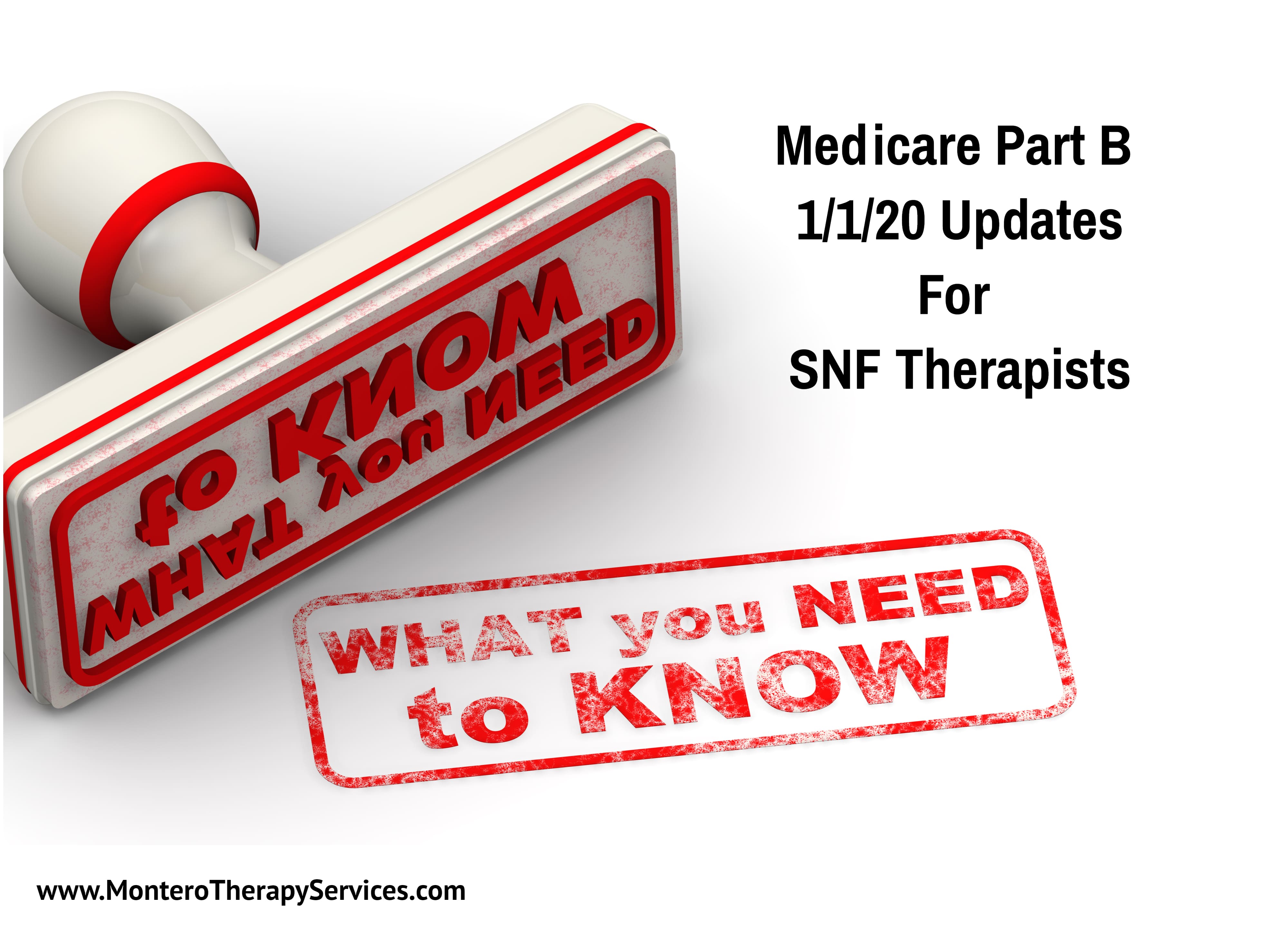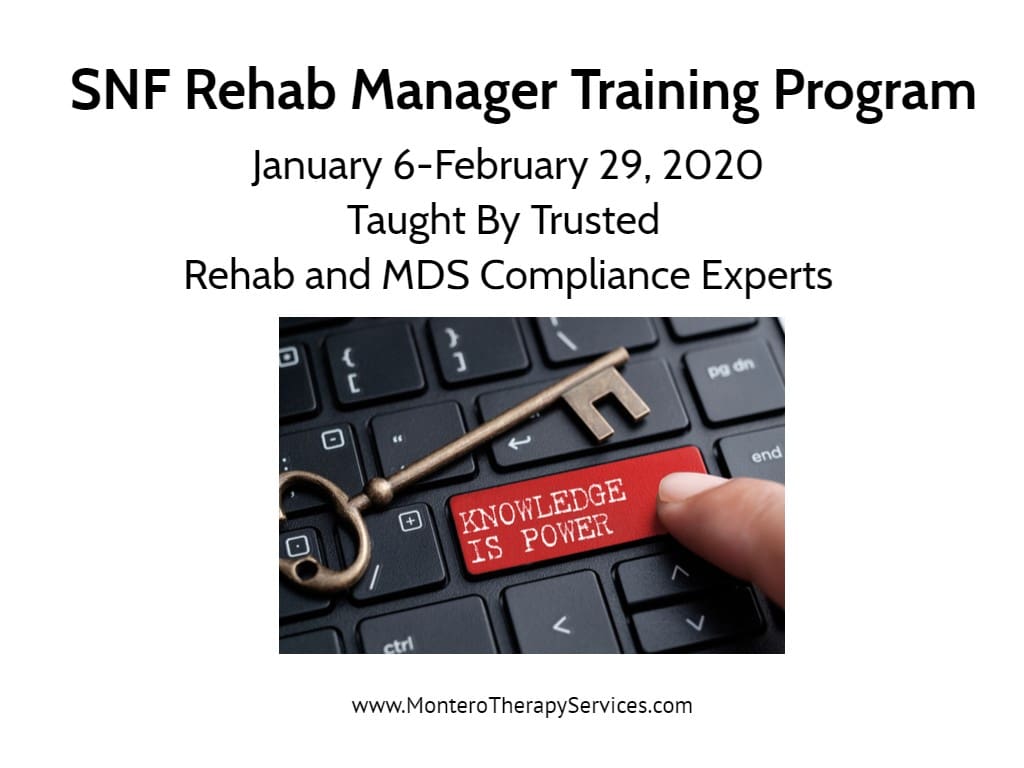
Therapists in the Skilled Nursing Facility (SNF) setting are starting out 2020 with a few new requirements to tackle. No shocker there. What isn’t changing these days?!!
The 2475-page Final Rule [Physician Fee Schedule Final Rule CY2020] released last week by CMS included updates to payment policies, payment rates, and quality provisions for services furnished under the Medicare Physician Fee Schedule (PFS). What services are furnished under the Medicare Physician Fee Schedule? You guessed it…. Medicare Part B.
Let’s take a quick look to see what changed {and what didn’t} from the Proposed Rule released in July.
What Do SNF Therapists Need to Know for January 1st, 2020?
1. Therapy Cap
- The cap has been gone for 2 years and is not coming back! But…..the Therapy Cap is now disguised as the KX Modifier Threshold
- Continued use of the KX modifier is required for all therapy services that “would have exceeded the previous therapy cap amounts”
- Therapy services over the “threshold” without the KX modifier will be denied
- New “threshold” for 2020 is $2080 for OT, $2080 for PT and Speech combined (up from this year’s amount of $2040)
- **Important reminder and repeated for therapists again in the Final Rule**
- “By applying the KX modifier to the claim, the therapist or therapy provider is confirming that the services are medically necessary as justified by appropriate documentation in the medical record.”
2. Manual Medical Review
- The manual medical review threshold continues at the same amount of $3000 until 2028
- Review is not automatic when the $3000 is reached. CMS is using targeted reviews, limiting reviews to “outliers” and those with questionable practice patterns
3. New and Deleted CPT Codes Used by PT, OT and Speech
- Cognitive Function Codes:
- Deleted Codes (See page 788)
- Deletion of code G0515: Current timed code used for cognitive skills development for Medicare Part B patients (This was the code that replaced 97532 in 2018)
- Deletion of code 97127: Current untimed code used for cognitive function intervention for non-Medicare Part B patients since 2018
- Replaced with 2 new codes- see below
- New Codes (New values and designations)
- 97129
- Definition: Therapeutic interventions that focus on cognitive function (eg, attention, memory, reasoning, executive function, problem solving and/or pragmatic functioning) and compensatory strategies to manage the performance of an activity (eg, managing time or schedules, initiating, organizing and sequencing tasks)
- Direct (one-to-one) patient contact
- Initial 15 minutes
- “Sometimes” therapy code designation – meaning can be used by PT, OT, SLP, Physicians, NPPs, etc
- 97130
- Definition: Therapeutic interventions that focus on cognitive function (eg, attention, memory, reasoning, executive function, problem solving and/or pragmatic functioning) and compensatory strategies to manage the performance of an activity (eg, managing time or schedules, initiating, organizing and sequencing tasks)
- Direct (one-to-one) patient contact
- Each additional 15 minutes (list separately in addition to code for primary procedure
- Add-on code for 97129 to code for each additional 15 minutes
- 97129
- Deleted Codes (See page 788)
- Trigger Point Dry Needling:
- Though dry needling is not prevalent in the SNF setting at this time, information is included here for reference as there has been much discussion on topic.
- New Codes
- 20560
- Definition: Needle insertion without injection 1, 2 muscles
- 20561
- Definition: 3 or more muscles; for dry need of musculature trigger points
- Will not be covered by Medicare at this time {and no…you should not be billing this under the Manual Therapy code for Medicare reimbursement}
- 20560
- Telehealth or E-Visits:
- New codes were released. However, these codes do not currently apply to PT, OT and Speech services as therapists are not considered approved providers under Medicare
4. Reduction of Payment for Part B Services Provided by Assistants
- New Modifiers for PTA and OTA Services (Starts on page 446)
- All therapy services on or after 1/1/20 provided in whole or in part by an Assistant will need to be billed using the new payment modifiers
- New PTA Payment Modifier: CQ
- New OTA Payment Modifier: CO
- This is in preparation for 1/1/22 when all therapy services provided in whole or in part by an Assistant will have a payment reduction of 15% applied
- CMS is defining in whole or in part as provision of more than 10% of a therapy service by an assistant
- CMS is defining therapy service as a “procedure” identified by a HCPCS code {A.K.A. CPT Code}. On a Part B claim, each “procedure” is identified line by line to include CPT codes, units and modifiers. The new modifiers would be added specifically to the procedure line item to show an assistant provided treatment that met the de minimis standard
- All therapy services on or after 1/1/20 provided in whole or in part by an Assistant will need to be billed using the new payment modifiers
- Criteria For Using New Modifiers
- What Did Therapists Object To In The Proposed Rule?
- 1. Needing Modifier When Assistant and Therapist Treat Together
- CMS reports they received over 9000 public comments on this section alone {because what they proposed did not make any sense!!}
- In the Proposed Rule, a surprising example of when the modifier would be needed was when the assistant is treating with the therapist, and the time spent by the assistant is greater than 10% of the total treatment. For example, if a resident had a 30 minute treatment by the therapist, and the assistant participated in 4 or more minutes of the session with the therapist, the modifier would be needed.
- Final Rule Result: CMS agreed that the time the assistant spends with the therapist in treating a patient should not be subject to a modifier and will no longer count for purposes of assessing need for modifier use {Yay!} The Rule finalized that only the minutes that the PTA/OTA spends independent of the therapist will count towards the 10% de minimis standard
- What Did Therapists Object To In The Proposed Rule?
- 2. The Term “Concurrent”
- CMS used the term “concurrent” to describe situations when a therapist and assistant were treating the same patient together, which conflicts with the Part A definition of concurrent
- Final Rule Result: CMS agreed that the term concurrent was confusing and it will not be used
- How To Bill Using Modifiers
- What Did Therapists Object To In The Proposed Rule?
- Needing Modifier On All Units of a Service/CPT When Assistant Participates
- CMS was mandating the application of the modifier to all units of a particular code when the assistant provides over 10%…so for example if an assistant provided 10 minutes of therapeutic exercise and the therapist provided 15 minutes of therapeutic exercise for the same patient on the same day, the modifier would be needed on both units billed, even though 1 full unit was provided without the assistant
- Current billing practice does not allow for 1 procedure code/CPT to be split into 2 separate lines on the claim, therefore forces the use of the modifier on the total units billed, as in the example above
- Final Rule Result: CMS agreed that this billing scenario did not make sense and are revising the definition of a “service” to which the de minimis standard is applied to include untimed codes and each 15 minute unit code. CMS is also revising final policy to allow the separate reporting on 2 different claim lines, of the number of 15 minute units of a code. So in the example above, 10 minutes with the modifier and 15 minutes without the modifier could be accomplished.
- New Documentations Requirements
- What Did Therapists Object To In The Proposed Rule?
- New Therapy Documentation Requirements
- CMS was mandating documentation on each service / procedure code to state if the assistant modifier was needed or not, as well as documenting to identify total treatment time provided by an assistant vs therapist
- Final Rule Result: CMS removed any new formal documentation requirements….but added the phrase “we clarify that we would expect the documentation in the medical record to be sufficient to know whether a specific service was furnished independently by a therapist or a therapist assistant, or was furnished “in part” by a therapist assistant, in sufficient detail to permit the determination of whether the 10 percent standard was exceeded.”
5. Rate Changes
- 2020: CMS uses a conversion factor (CF) to calculate payment rates. The 2020 CF is $36.09, which is a minimal increase over the $36.04 CF for 2019
- 2021: The proposed 8% cuts for 2021 still stand. These cuts are for multiple codes and specialties including: PT, OT, Audiology.
- Cuts are proposed to balance the adjustments made to Evaluation and Management codes used by other specialties
- See page 1898 of the Rule for a chart of specialties and % cuts expected
- We are awaiting details from CMS as to which codes will be cut…more to come on this topic as the implementation date is 1/1/21
- 2022: Proposed 15% payment reduction for services provided by PTA/OTA
- Did you know you can look up any CPT code and check the rate HERE ?
Change…
Change in the SNF is what we are used to. Every year. Without fail. But it is nothing that SNF therapy professionals can’t handle!
Remember, these changes are for Part B therapy only, regardless of the setting. These changes will carry over to Chapter 15 of the Medicare Benefit Policy Manual after January 1st.
In the meantime, if you have any questions about the information or how it will impact you, send them to our Just Ask Q&A Forum. There you can also take a peek at all the other questions your peers are asking.
In Your Corner,
Dolores
Dolores Montero, PT, DPT, RAC-CT, RAC-CTA
SNF Therapy & MDS Compliance Experts
Links if you want to further explore this area
Link to PDF With Key Info Highlighted for SNF Therapy
Chapter 15 – Medicare Benefit Policy Manual Rules for Part
Register for our next REHAB MANAGER TRAINING PROGRAM

